| dc.description.abstract | Childfreedom is becoming an increasingly important topic of research worldwide, particularly since it is understood as a deviation from dominant pronatalist culture. Still, childfree choices related to climate change remains under-researched. When the BirthStrike movement was launched in 2018 by climate activist Blythe Pepino, it connected the issues of climate change to reproductive matters, as arguments for childfreedom as alleviating climate change were made. The thesis presents a phenomenological study of seven members of the BirthStrike movement’s childfree choice. Specifically, the research objectives include exploring members of BirthStrike’s understanding of childfreedom as climate action, and the motivations for and experiences leading to their childfree choice. Furthermore, the study explores how life purpose and meaning is constructed in pronatalist surroundings framing parenthood as the meaning of life. Lastly, the study explores how participants understand and do gender through renegotiating links between parenthood and gender expression. Using a qualitative methodology, participants were interviewed in-depth. Data generated was coded and interpreted inductively, with using theories of doing and undoing gender as well as the concepts of reproductive governance, intimate citizenship, and everyday resistance.
Findings include a reframing of parenthood as constraining and having children as, considering the climate crisis, irresponsible. Furthermore, participants value agency, autonomy, and self-actualisation, preferring to question rather than conform to pronatalist norms. BirthStrike provided people anxious about climate change comfort by confirming that likeminded individuals validated their reluctance to procreate. The study concludes that participants present an alternative moral regime to that of pronatalism, wherein childfreedom is viewed as responsible and morally justified compared to parenthood if presented in relation to the climate crisis. Climate change fosters climate anxieties, but the participants’ childfree choice provides a way of mitigating negative emotions as it gives them time and ability to focus on what is meaningful and purposeful to them. | |
